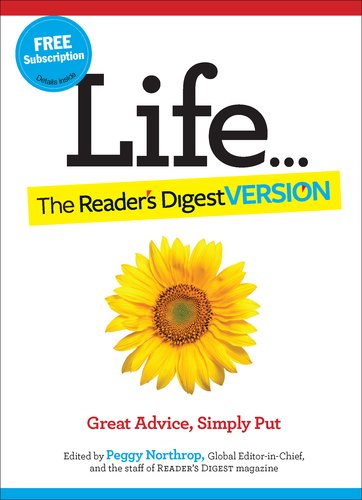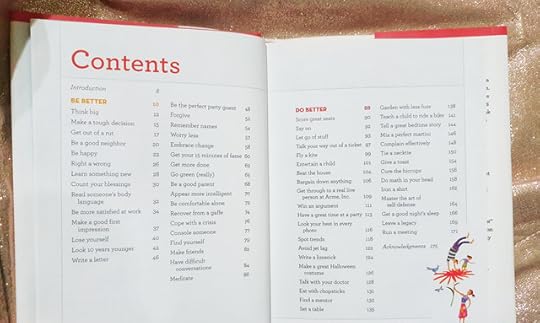What do you think?
Rate this book


176 pages, Hardcover
First published July 21, 2011
This book literally only took 37 minutes of my life. I can’t believe it!

For context, I’ve not had much luck with reading self-help/advice books. I’ve always found them to be about 200 pages too long when they’re explaining a concept which I’ve understood in the first paragraph. The rest of the books are usually just arguments and examples to desparately convince you to believe them. Yet I have to grudgingly consume everything until the bitter end because I worry I might be missing out on a hidden gem or two if I simply tossed the book aside. Afterall, there’s a reason they had to make the book hundreds of pages, right?
Wrong.
This book is divided into 2 main sections – to be better and to do better. With 32+34 subsections, they’re sharing advice in at least 66 aspects of life. The best part is how precise and concise everything is – the subsections are explained in bullet points, with the accompanying explanations varying from 1 sentence to perhaps 3 paragraphs at most.
Sure, they’re not ground-breaking advice that you may never have heard of – in fact, so many concepts from notable self-help books are mentioned and summed up in context. And even if some of them seem to be common sense, sometimes it’s nice to be reminded anyway. Some of them are just practical tasks that you know you should do but reading it just spurs you into action - like reclaim your space from messes and enjoying the space cleaned out in your head and on your desk.
Some of my summary notes:
How to right a wrong: empathize to validate their feelings, no qualified apologies (If I hurt you, I’m sorry. If I did anything wrong, I’m sorry), make amends by repairing the damage, assure the aggrieved person it won’t happen again and make sure it doesn’t.
Learn something new: Carpe momentum – even 5-10 minutes at a time adds up.
Be more satisfied at work: to get the credit you deserve, share it with others. Flip side: don’t share blame, avoid finding a fall guy and don’t single out another person. Is whatever that upset you important?
Write a letter: write a thank you note = gift, delight, appreciation for thoughtfulness, soon. Condolence note = God’s will/at least not suffering anymore is only for the aggrieved to say, when they’re ready.
Forgive: come clean - confront them with your hurt, not their shortcomings; if no mea culpa – remove person, reevaluate later if apology comes.
Remember names: focus, ask and repeat, create mental connection and speak it aloud, use the name.
Get more done: set timer and challenge yourself, don’t avoid delegating because it’s easier to do it myself (martyrlike and exhausting!), break down task in bite-size jobs – faster progress and feel more accomplishment.
Be comfortable alone: spend time being neither friend, employee, or daughter. Leave behind identity (eg the dependable one, the funny one). Being alone is not wasted time, your time is yours.
Do math in your head: dividing by 5 = x2, remove zero. 11 rule = separate digits, put sum in between. If >9, move to left. KM -> miles = first digit x 6.
Cope with a crisis: feel free to freak out but not forever (get present: feel your feet on the ground, your back against the chair), accepting something =/= not wanting to change it but until then, you can’t start to fix it. Reframe – crisis isn’t something that happened to you (victim), it’s something that happened for you. Crisis = dangerous opportunity, keyword opportunity.
Find yourself: take a good, hard look at yourself – you might not like what you see but take ownership and commit to scary changes. Keep diary. Take inventory. Go back to your passions – reading, writing, painting, craft. Who you surround yourself with is who you become. Serve others.
Have difficult conversations: with someone with bad breath – “I hope you won’t be offended, but sometimes your breath can be a little strong.”
Say no: “No, but thank you for asking.” “I’d love to, but I simply can’t make that big a commitment. Is there some other way I could help out?” “I’m not able to take that on right now”. 10-10-10 rule: for every decision, ask yourself how you’re likely to feel after 10 minutes, 10 months, and 10 years.
Entertain a child: “Can you help me?”
Some thoughts: